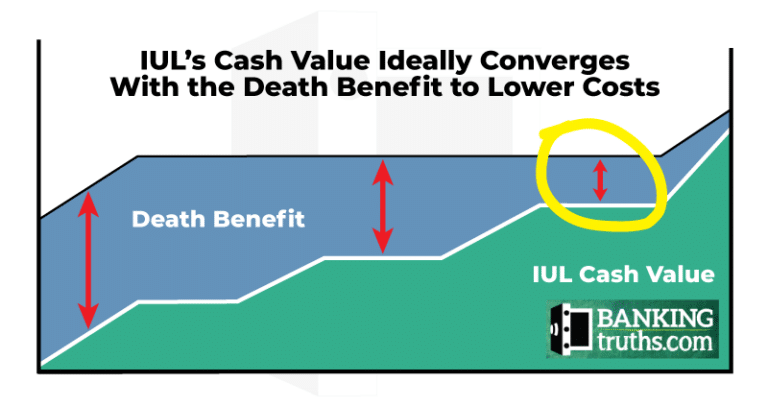All Categories
Featured
Table of Contents
1), frequently in an effort to defeat their classification averages. This is a straw guy disagreement, and one IUL folks love to make. Do they compare the IUL to something like the Lead Total Stock Exchange Fund Admiral Show no load, an expenditure proportion (ER) of 5 basis points, a turnover ratio of 4.3%, and an exceptional tax-efficient record of distributions? No, they compare it to some terrible proactively handled fund with an 8% lots, a 2% EMERGENCY ROOM, an 80% turn over proportion, and an awful document of temporary funding gain distributions.
Common funds usually make annual taxed distributions to fund owners, also when the value of their fund has actually dropped in value. Mutual funds not only call for earnings reporting (and the resulting yearly tax) when the common fund is going up in worth, however can likewise enforce income tax obligations in a year when the fund has decreased in value.
That's not exactly how shared funds function. You can tax-manage the fund, harvesting losses and gains in order to decrease taxed distributions to the capitalists, yet that isn't in some way mosting likely to change the reported return of the fund. Just Bernie Madoff types can do that. IULs stay clear of myriad tax obligation catches. The possession of common funds might require the common fund owner to pay projected tax obligations.

IULs are easy to place so that, at the proprietor's death, the beneficiary is not subject to either income or estate taxes. The same tax obligation decrease techniques do not function nearly too with mutual funds. There are countless, frequently expensive, tax catches related to the moment buying and marketing of shared fund shares, catches that do not put on indexed life Insurance policy.
Possibilities aren't really high that you're going to undergo the AMT because of your common fund distributions if you aren't without them. The rest of this one is half-truths at best. For circumstances, while it is true that there is no earnings tax obligation because of your beneficiaries when they acquire the earnings of your IUL policy, it is additionally real that there is no revenue tax as a result of your successors when they inherit a mutual fund in a taxed account from you.
What Is A Group Universal Life Insurance Policy
The federal estate tax exception limitation is over $10 Million for a couple, and expanding each year with rising cost of living. It's a non-issue for the substantial bulk of doctors, a lot less the rest of America. There are far better methods to stay clear of inheritance tax concerns than getting investments with low returns. Common funds may create earnings taxation of Social Protection advantages.

The development within the IUL is tax-deferred and may be taken as tax obligation complimentary earnings by means of car loans. The policy proprietor (vs. the shared fund supervisor) is in control of his/her reportable income, hence enabling them to minimize or even get rid of the tax of their Social Safety benefits. This set is terrific.
Right here's another very little concern. It's real if you get a shared fund for state $10 per share simply prior to the circulation date, and it disperses a $0.50 distribution, you are then mosting likely to owe tax obligations (probably 7-10 cents per share) regardless of the truth that you haven't yet had any gains.
In the end, it's truly about the after-tax return, not exactly how much you pay in tax obligations. You are going to pay more in tax obligations by making use of a taxed account than if you get life insurance policy. You're additionally probably going to have more cash after paying those tax obligations. The record-keeping needs for possessing common funds are considerably a lot more intricate.
With an IUL, one's records are maintained by the insurance provider, copies of annual declarations are mailed to the owner, and circulations (if any) are totaled and reported at year end. This is likewise sort of silly. Of training course you need to keep your tax documents in situation of an audit.
Universal Guaranty Investment Company
All you need to do is shove the paper right into your tax obligation folder when it appears in the mail. Barely a factor to purchase life insurance policy. It's like this person has actually never purchased a taxable account or something. Shared funds are commonly component of a decedent's probated estate.
Additionally, they undergo the hold-ups and expenditures of probate. The earnings of the IUL policy, on the other hand, is always a non-probate distribution that passes outside of probate directly to one's named recipients, and is as a result exempt to one's posthumous financial institutions, unwanted public disclosure, or similar delays and prices.
We covered this under # 7, but simply to evaluate, if you have a taxed common fund account, you need to put it in a revocable trust (and even less complicated, use the Transfer on Death designation) in order to avoid probate. Medicaid incompetency and life time income. An IUL can offer their owners with a stream of income for their whole life time, no matter the length of time they live.

This is helpful when organizing one's events, and transforming properties to revenue before a retirement home confinement. Mutual funds can not be transformed in a similar way, and are nearly constantly taken into consideration countable Medicaid properties. This is one more dumb one advocating that inadequate people (you know, the ones that need Medicaid, a federal government program for the bad, to spend for their retirement home) need to make use of IUL rather than mutual funds.
Using Iul For Retirement
And life insurance policy looks awful when compared rather against a pension. Second, people who have money to get IUL over and beyond their pension are mosting likely to have to be awful at taking care of cash in order to ever before get Medicaid to spend for their nursing home prices.
Persistent and terminal disease cyclist. All plans will allow a proprietor's simple accessibility to money from their plan, typically forgoing any kind of abandonment fines when such people experience a significant illness, require at-home treatment, or end up being restricted to an assisted living facility. Common funds do not offer a comparable waiver when contingent deferred sales charges still apply to a shared fund account whose owner requires to sell some shares to fund the prices of such a remain.
The Difference Between Whole Life And Universal Life Insurance
You obtain to pay more for that benefit (rider) with an insurance plan. Indexed global life insurance supplies fatality benefits to the recipients of the IUL owners, and neither the owner nor the beneficiary can ever shed money due to a down market.
I absolutely don't require one after I get to monetary independence. Do I want one? On standard, a buyer of life insurance pays for the real expense of the life insurance coverage advantage, plus the expenses of the policy, plus the revenues of the insurance business.
Guaranteed Universal Life Policy
I'm not completely sure why Mr. Morais tossed in the entire "you can't shed cash" again below as it was covered fairly well in # 1. He just intended to duplicate the very best marketing point for these points I expect. Again, you do not lose nominal bucks, yet you can shed genuine bucks, as well as face significant opportunity price because of reduced returns.
An indexed global life insurance policy plan proprietor might exchange their policy for an entirely different policy without activating earnings tax obligations. A shared fund proprietor can not move funds from one mutual fund firm to one more without offering his shares at the former (thus setting off a taxed occasion), and buying new shares at the last, frequently subject to sales charges at both.
While it is real that you can exchange one insurance coverage policy for one more, the factor that individuals do this is that the very first one is such a dreadful plan that even after getting a new one and going through the early, negative return years, you'll still appear ahead. If they were marketed the best plan the very first time, they should not have any kind of need to ever exchange it and experience the early, unfavorable return years once more.
Table of Contents
Latest Posts
Universal Life Comparison
Universal Life Insurance Reviews
Insurance Indexation
More
Latest Posts
Universal Life Comparison
Universal Life Insurance Reviews
Insurance Indexation